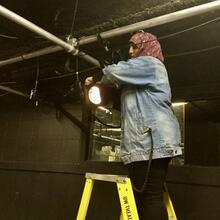
It’s all about community and working together
Arts graduate May Nemat Allah thrives on working collaboratively and setting the stage for marginalized voices to be heard

Arts graduate May Nemat Allah thrives on working collaboratively and setting the stage for marginalized voices to be heard
By Miriam Rusu Faculty of ArtsSwitching from Science to Arts might sound terrifying to some students, but that’s exactly what May Nemat Allah decided to do after her first year of undergraduate studies. While she had enjoyed studying drama in high school, she initially chose to focus her university career on another area of interest: chemistry and biology. Yet theatre remained close to her heart, and she had a happy accident of stumbling upon the University of Waterloo’s Theatre and Performance program.
“When I realized I wanted to pursue a career in theatre, I was worried that I would not feel welcomed or like I belonged in the Faculty of Arts,” May reflects. “How lucky I am to have been proven so wrong.” Graduating this week with her BA Honours Co-op, and with the Theatre and Performance program’s 2021 award for top performing student, she says, “It made sense to be where I knew I was going to be happier.”
 The collaborative nature of theatre fuels May’s passion for the discipline. “The thing about theatre and what I love most is that it’s all about ensemble, it’s all about community and togetherness,” she explains. Through most of her program, May concentrated on the stage management side of theatre, her core area of interest. Many of her courses and experiences focused on production management, particularly the role of the stage manager. “Theatre is amazing, but the backstage is where it’s at for me. The show can’t stand without its legs, and I always think that technical production is the legs. We’re the rock, the support, the foundation.”
The collaborative nature of theatre fuels May’s passion for the discipline. “The thing about theatre and what I love most is that it’s all about ensemble, it’s all about community and togetherness,” she explains. Through most of her program, May concentrated on the stage management side of theatre, her core area of interest. Many of her courses and experiences focused on production management, particularly the role of the stage manager. “Theatre is amazing, but the backstage is where it’s at for me. The show can’t stand without its legs, and I always think that technical production is the legs. We’re the rock, the support, the foundation.”
She describes the shared experience of ensemble work. “We had this moment where we would all sit in our starting positions and wait for the first cue. In that moment of quietness, the anticipation was filled with this feeling of love and appreciation that we all held together. I think that feeling is electric, and I loved being a part of it.”
 Now working at the Stratford Festival for the summer, May says a particularly influential person in her developing career is Janelle Rainville, director of production and Theatre Operations. “Janelle has pushed me in so many directions that led to amazing opportunities. She’s the reason why I applied to become a production assistant in Stratford. She’s the reason why I applied to NTS (National Theatre School) for the next step of my education. She’s been such a light in my life and such an amazing mentor.”
Now working at the Stratford Festival for the summer, May says a particularly influential person in her developing career is Janelle Rainville, director of production and Theatre Operations. “Janelle has pushed me in so many directions that led to amazing opportunities. She’s the reason why I applied to become a production assistant in Stratford. She’s the reason why I applied to NTS (National Theatre School) for the next step of my education. She’s been such a light in my life and such an amazing mentor.”
This is especially evident in the opportunity May had as a conference assistant for SMArts (Stage Managing the Arts), a professional development conference organized by Janelle for stage managers, technical directors, and production managers across the country. May’s role— assisting in organizing courses and meetings, creating contracts, and developing social media assets — allowed her to improve on a variety of her skills and knowledge of stage management. Her experience with SMArts exposed her to invaluable work-integrated learning alongside the courses in the Theatre and Performance program, all of which built confidence for her current role as a production assistant for the Stratford Festival.
COVID-19 has caused significant disruption, and theatre is no exception. May knows this first-hand. “Working in theatre during the pandemic, things are changing so fast. It gave me a new appreciation for what it means to be adaptable and to look at things positively rather than obsess over the possibility of failure.”
The pandemic brought about an opportunity for May to perform too. With the very limited number of students allowed on campus during the winter 2021 term, the program’s production required the team to double and triple up on roles — which for May meant she was both an actor and the assistant production manager (APM). The livestreamed play, carried away on the crest of a wave by David Yee, explored the stories of people around the world who were impacted by the 2004 Indian Ocean tsunami. “It’s a really beautiful show that makes a very explicit point of talking about stories about people of colour. If there was any show that I was going to work as an actor on it would be this one,” she says.
For May, the opportunity to perform both as an actor (shown in the banner photo above) on stage and an APM offstage was indispensable. “I really did benefit from having that experience and having such kind leadership from Professor Andy Houston, the director, and Janelle. Having them both guide me through what it means to be an assistant production manager and what it means to be an actor was a full experience — I learned so much in one semester that I never expected I possibly could because of the pandemic.”
This fall, May will start her next chapter at the National Theatre School in Montreal, specializing in Production Design and Technical Arts. “It’s my dream to become someone who can support the creation of impactful theatre, accessible theatre and theatre that decentralizes Western voices and centralizes marginalized and unheard voices. I think I can really do that as I learn more.”
Reflecting back on her undergraduate studies, May emphasizes the importance of putting yourself out there: “I think it’s really easy in university to let things happen and go with the flow. University experiences can be more fruitful if you want them to be and if you put in the effort. That’s entirely what the Theatre and Performance program at UWaterloo is all about.”
Watch May's love letter to the Theatre and Performance program:

Read more
Meet the 14 exceptional students representing Waterloo’s newest grads

Read more
University of Waterloo and Progressive Generation Holding partner to deliver world-class media production and boost creative economy

Read more
Discover how Waterloo alumni are driving Canada’s economy with five tech companies making a local and global impact
The University of Waterloo acknowledges that much of our work takes place on the traditional territory of the Neutral, Anishinaabeg, and Haudenosaunee peoples. Our main campus is situated on the Haldimand Tract, the land granted to the Six Nations that includes six miles on each side of the Grand River. Our active work toward reconciliation takes place across our campuses through research, learning, teaching, and community building, and is co-ordinated within the Office of Indigenous Relations.